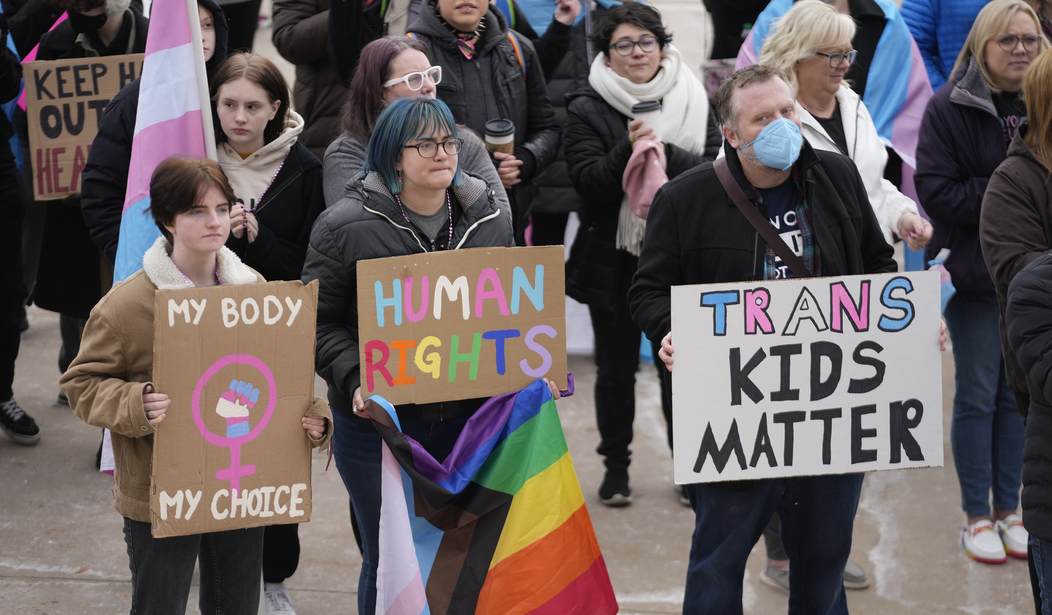It sounds like there's something not-so-rotten in Denmark, according to a recent report detailing how the country is moving away from the "gender-affirming care" model for children suffering from gender dysphoria. It has become the latest European nation to rethink its approach to helping minors dealing with this mental illness. This is a positive sign, but for those of us in America still fighting against the progressive push for transing children, it raises an important question: When will we finally wake up?
Denmark is reportedly shifting its approach to gender identity in children. Instead of immediately prescribing medical treatments such as puberty blockers, hormones, and surgery, it is now favoring the use of therapeutic counseling for children.
The change came about after systematic reviews of the effects of the "gender-affirming care" model and concerns about the long-term impact of these treatments:
A major medical journal Ugeskrift for Læger, the Journal of the Danish Medical Association, confirmed that there has been a marked shift in the country’s approach to caring for youth with gender dysphoria. Most youth referred to the centralized gender clinic no longer get a prescription for puberty blockers, hormones or surgery—instead they receive therapeutic counseling and support.
In the course of less than a decade, like every other Western country, Denmark experienced an exponential increase in the number of young people presenting with gender dysphoria. In 2014, there were only 4 documented pediatric cases who requested gender reassignment. By 2022, the number of referrals grew by 8700% to 352, similar to the several-thousand-percent increase in less than a decade witnessed by a number of Western countries. As the number of young people wishing to undergo gender reassignment increased, so did the rates at which Danish gender clinicians transitioned them. By 2018, Denmark's centralized gender service was medically transitioning 65% of referred youth. This was similar to the proportion of referred children who got transitioned reported by other pediatric gender clinics. For purposes of comparison, the Netherland’s Amsterdam gender clinic reports transitioning 73% of late-onset referrals and 85% of early-onset referrals and in the US, researchers analyzing data from Seattle Children’s Hospital gender clinic reported that over 60% of the referrals underwent medical transition with puberty blockers or cross-sex hormones within one year of intake.
Danish physicians have started to question prior Dutch studies casting a positive light on "gender-affirming care" largely because of the growing rates of patients who decide to detransition after having been given puberty blockers and other treatments. Instead of continuing to use this approach, they caution against it, and emphasize psychological assessments and therapy.
The Danish clinicians are concerned by growing rates of detransition among those who initiated transition in youth and a lack of research into the detransition phenomenon. “In recent years, there have been reports of reversal of hormone-induced permanent changes to the body that began in youth. There are no systematic estimates of the frequency or reasons why hormone treatment is discontinued.”
This is quite a significant development as the United Kingdom, Finland, Sweden, and other European nations have also begun shifting away from the "gender-affirming care" model for children. It seems clinicians in these countries are realizing that, despite what proponents claim, there is not nearly enough data and evidence showing that this approach is beneficial to children, especially after they become adults.
Moving away from the "gender-affirming care" model will not only protect children from being subjected to questionable and dangerous treatments, but it will also allow medical professionals to seek out alternatives that could benefit their mental health. They can employ methods that have already been shown to be successful. Instead of rushing to use puberty blockers and surgery, they can allow the child to explore more healthy ways to deal with their condition. Studies have shown that the overwhelming majority of kids dealing with gender dysphoria grow out of it by the time they become adults without the use of these treatments.
Denmark has taken a positive step in the right direction. Like several other European nations, they seem to understand how harmful the "gender-affirming care" model is. But what of the United States? Americans were late to the game when it comes to using this method, and progressives are still aggressively pushing to force this approach on children. They have gone so far as to promote legislation allowing the government to kidnap children whose parents do not affirm their chosen gender identity. These folks are doing everything possible to persuade kids and parents to accept their gender ideology by incorporating these ideas into school curriculum.
Yes, there has been a significant backlash against the effort to trans children. I believe at some point, the opposition will eventually succeed. But how many young lives will be ruined before this happens?













